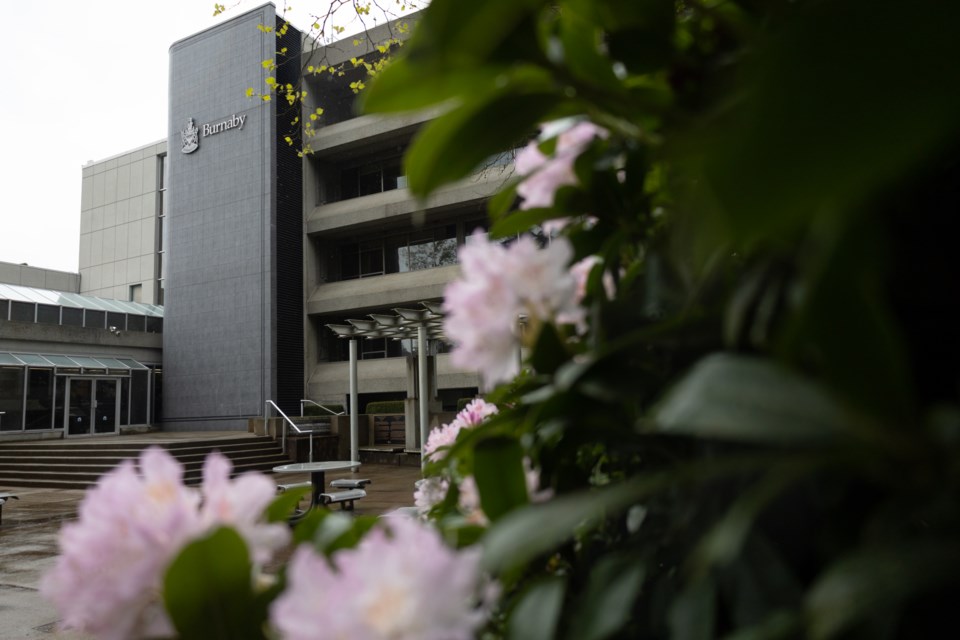Burnaby council has approved this year's property tax rate increase at 4.5 per cent.
The average residential home valued at $1.3 million will be taxed a total of about $2,010 this year, an increase of about $87, according to the city’s new five-year financial plan.
The increase “slightly exceeds” the national inflation rate, but the city says many of its services and programs are affected by significant cost escalations, particularly in construction and public safety.
The property tax rate was driven by “additional funding requirements for community safety needs such as fire services, RCMP and E-Comm contracts,” as well as wage increases and “inflationary pressures.”
Water and sewer services are provided by Metro Vancouver, which passed on tax increases to Burnaby of 7.6 per cent for water and 28.9 per cent for sewer.
The city called these increases “significant,” and lowered the rates passed on to residents to zero per cent for waterworks and five per cent for sewer by pulling from its reserves.
Property taxation is the primary funding source for city services this year at a total of $376.9 million, which is 35.9 per cent of the city’s total revenue.
Council greenlit the tax hike along with the five-year financial plan.
The plan for 2024 includes a $677.7 million operating budget and $372.5 million allotted to capital projects.
The plan now includes about $40.4 million in funding over four years from the federal government’s Housing Accelerator Fund.
Councillors expressed concern about the program, during budget discussions in October, as it is going to be used for staffing various real estate positions (such as manager of acquisitions and dispositions, property valuator negotiator and real estate analyst).
Those staff positions, costing around $10 million per year, may have to be incorporated into the tax base when the federal funding runs out.
Burnaby council talks taxes
At a council meeting Monday, Jan. 29, OneBurnaby Coun. Richard Lee opposed the tax increase, in line with his previous votes on all tax increases.
Lee said he has heard feedback from residents who don’t agree with the increase.
He said the city’s financial position “seems quite healthy” but small businesses and homeowners have been going through hard times.
The city had an estimated $2.4 billion in reserves at the end of last year. ($2.6 billion is earmarked for capital projects in the current financial plan.)
Lee was the sole opposition, and the budget passed with all other councillors in favour.
Burnaby Citizens Association (BCA) Coun. Pietro Calendino called this year’s tax rate “a very modest increase.”
“To Coun. Lee, I think he needs to keep in mind that the increases that the public face out there, the city faces as well,” Calendino said.
He noted the reserves are already being used to lower the tax rate by three or four per cent, and staff’s original proposed tax rate was eight per cent.
“I think (the rate is), if not the lowest, among the lowest in Metro Vancouver for tax increases, and if we were to do differently, I think we would have to close down services and shut down some doors and I’m not prepared to do that.”
BCA Coun. Sav Dhaliwal agreed and added the city may not be getting as much money from developers in future years due to recent big changes in provincial housing policy.
The city has a program in which the city allows developers to build more housing in exchange for cash, called “community benefit bonuses.”
The city expects to receive $150 million this year from developers in 2024, which is much less than previous years.
In 2023, the city expected to get $237.2 million. In 2022, the city received $250.7 million, and the year before, developers paid $341.7 million.
A “significant portion” of the city’s capital reserves are made up of these developer contributions; more than half of the money for the 2024 capital plan will come from developer contributions.
The city said the new housing legislation introduced by the province have created “challenges” to the community benefit program, along with the current “uncertain” market which may result in less development compared to previous years, according to the financial plan.
Burnaby’s 2024 capital plan (paid for by developer contributions)
Money listed is what’s budgeted in the five-year plan
- City hall redevelopment ($400 million)
- Cameron Community Centre and Library ($260.9 million; project is currently delayed due to being overbudget)
- Confederation Park Community Centre ($238.1 million)
- Burnaby Lake Recreation Complex ($223 million; council approved $240-million budget in December)
- RCMP facility redevelopment ($193 million; council approved a budget increase to $229 million this week)
- Willingdon-Brentwood Community Centre ($136.6 million)
- James Cowan Theatre redevelopment ($55 million)
- Bonsor Recreation Complex redevelopment ($29.2 million)
- Burnaby Animal Shelter ($11.4 million)
- Burnaby Mountain Air Bike Skills course redevelopment ($4.3 million)
- Central Park destination playground and event space ($3.5 million)





